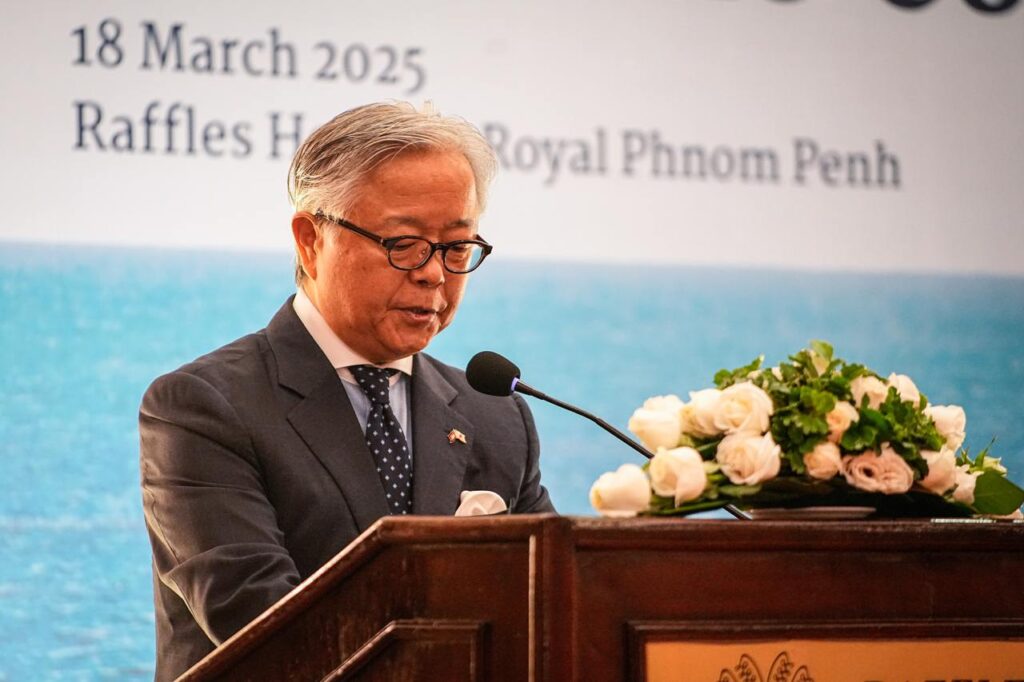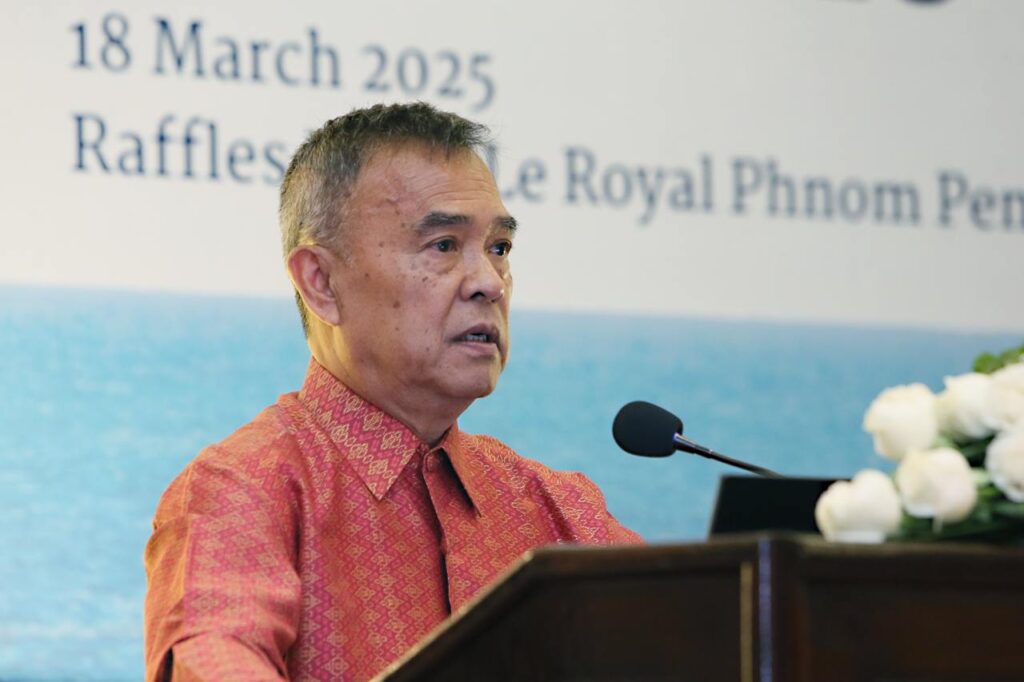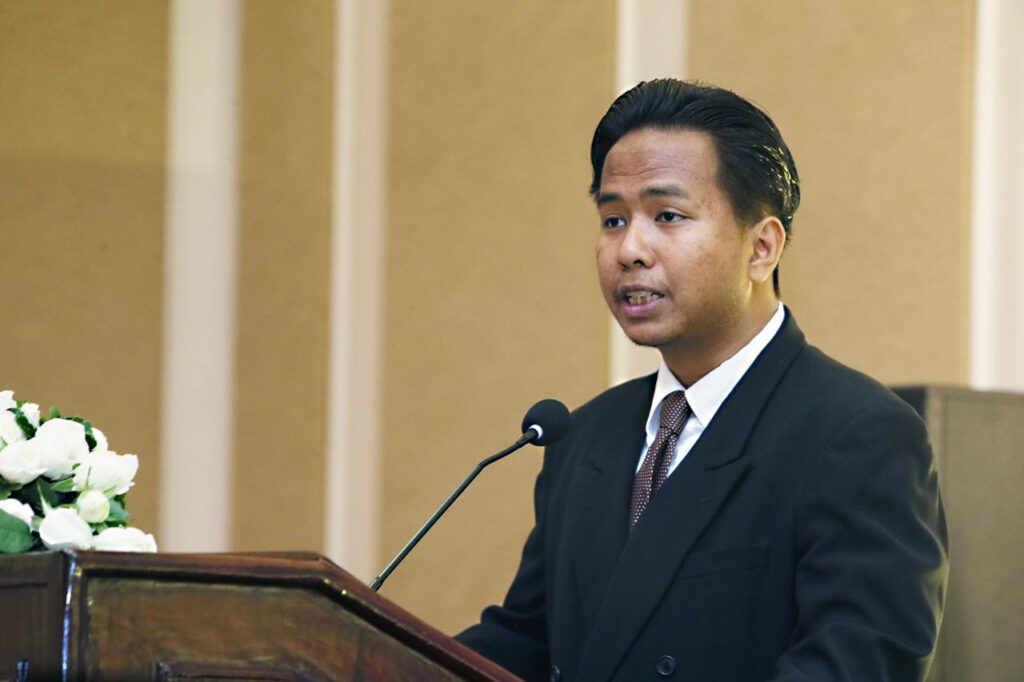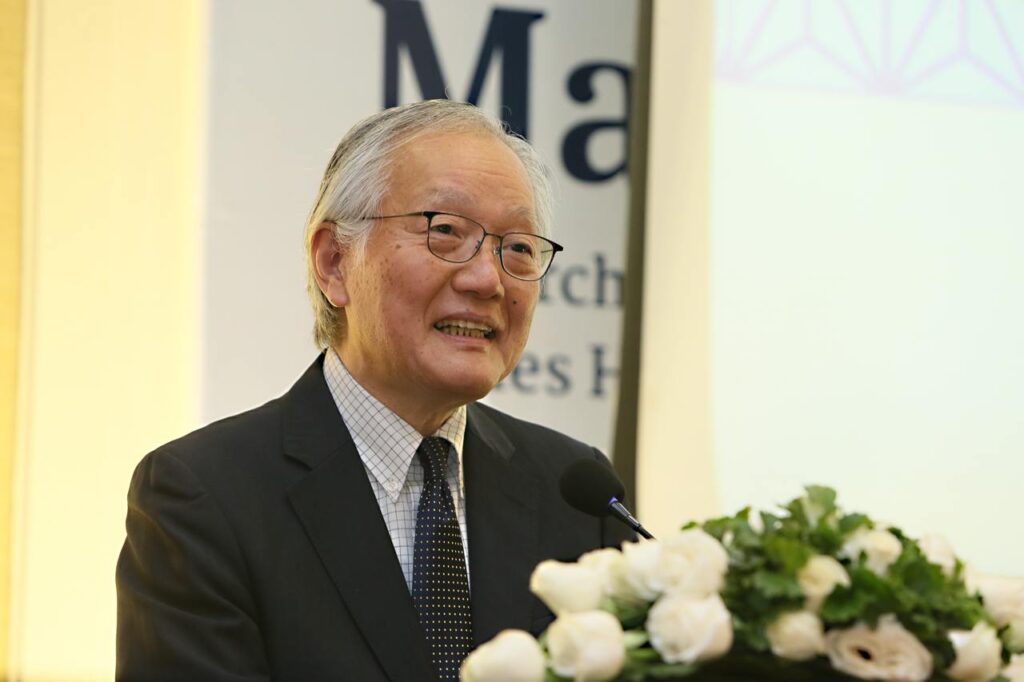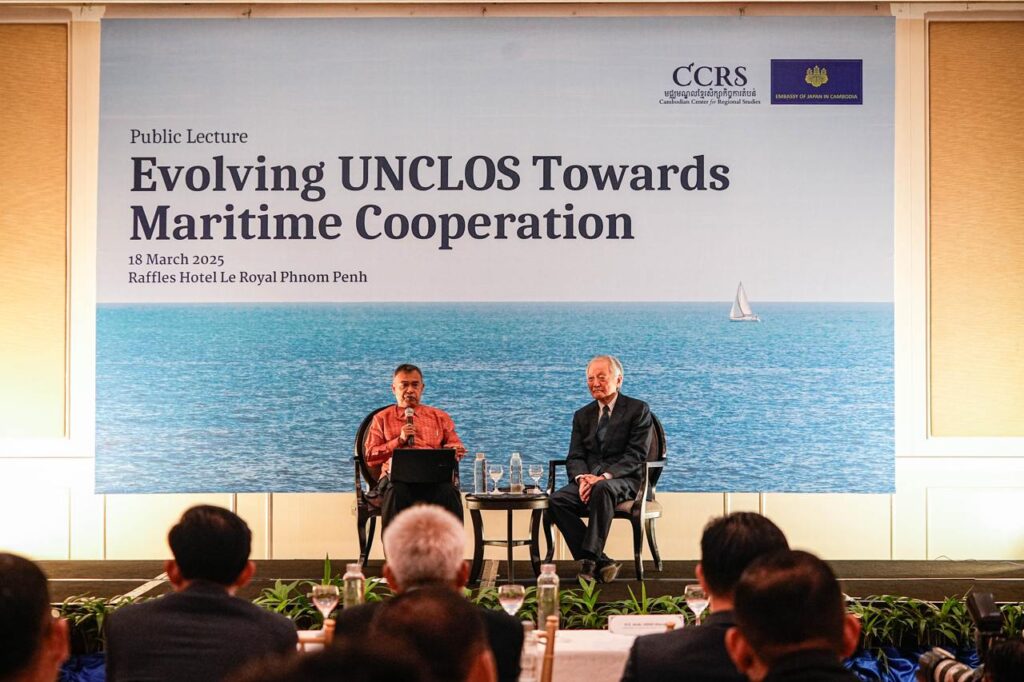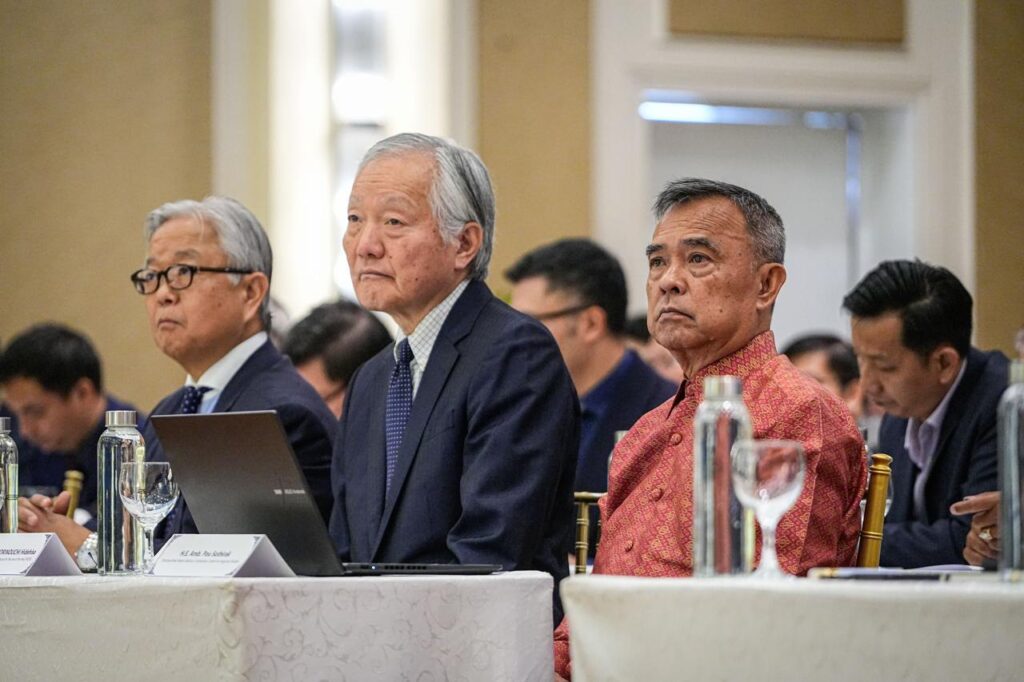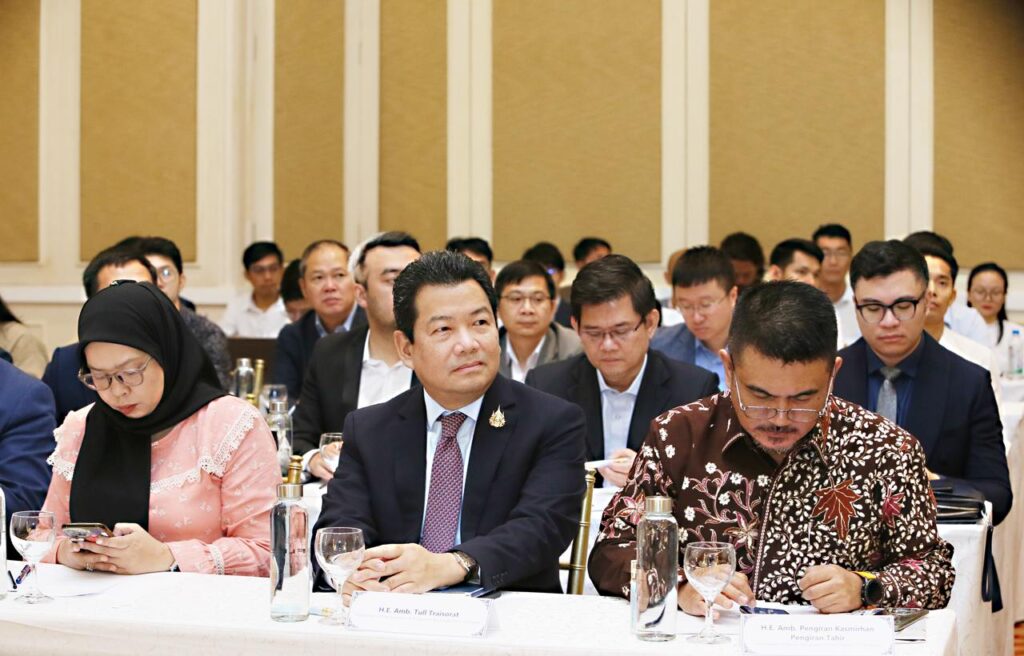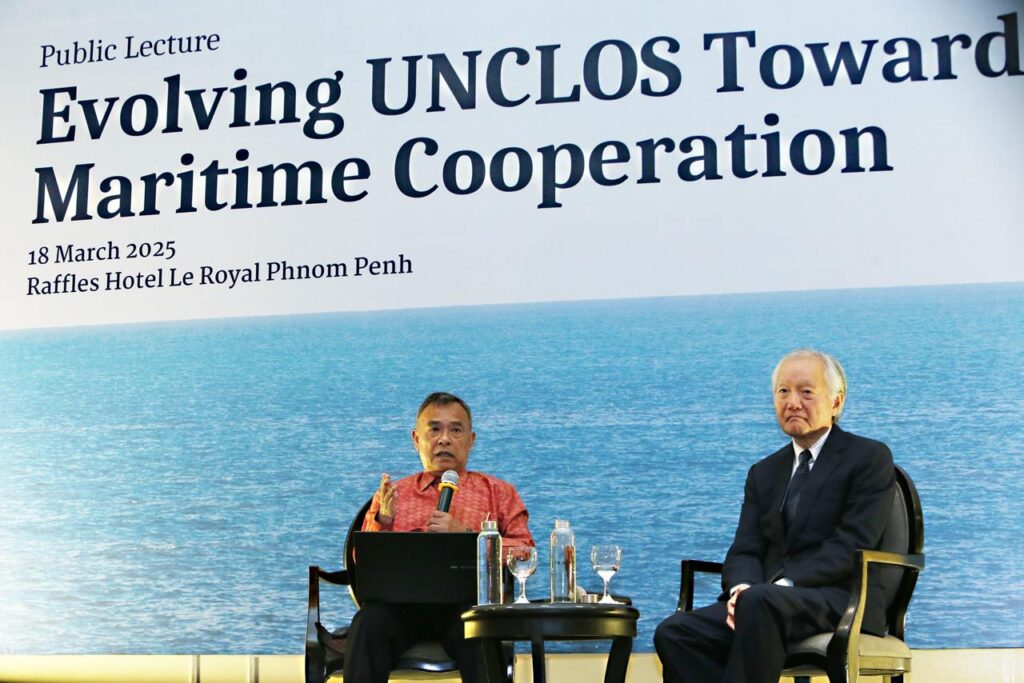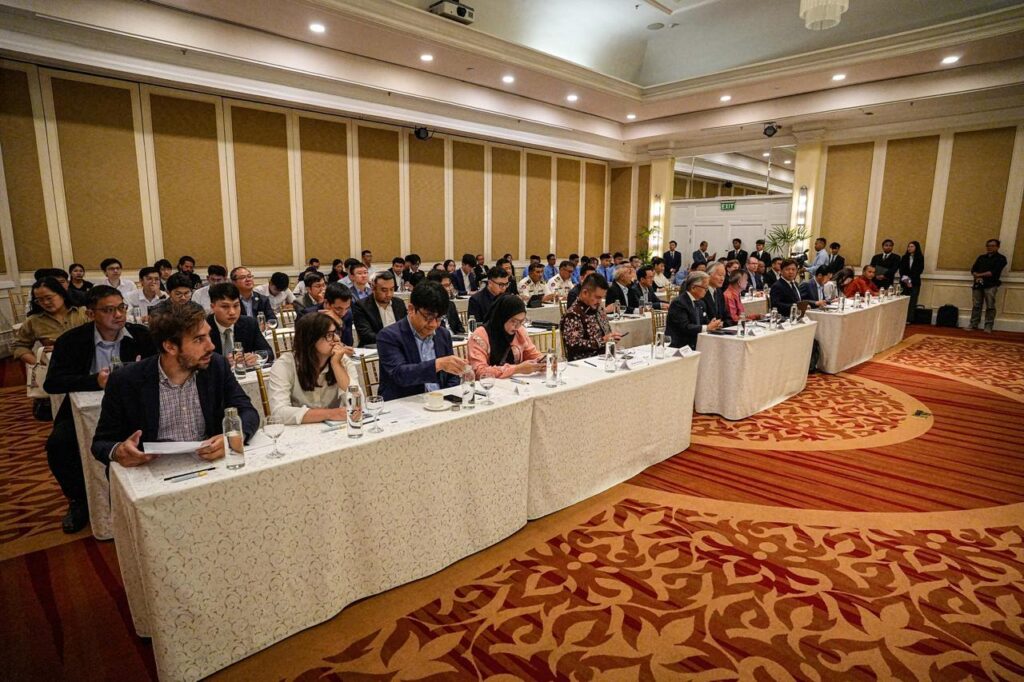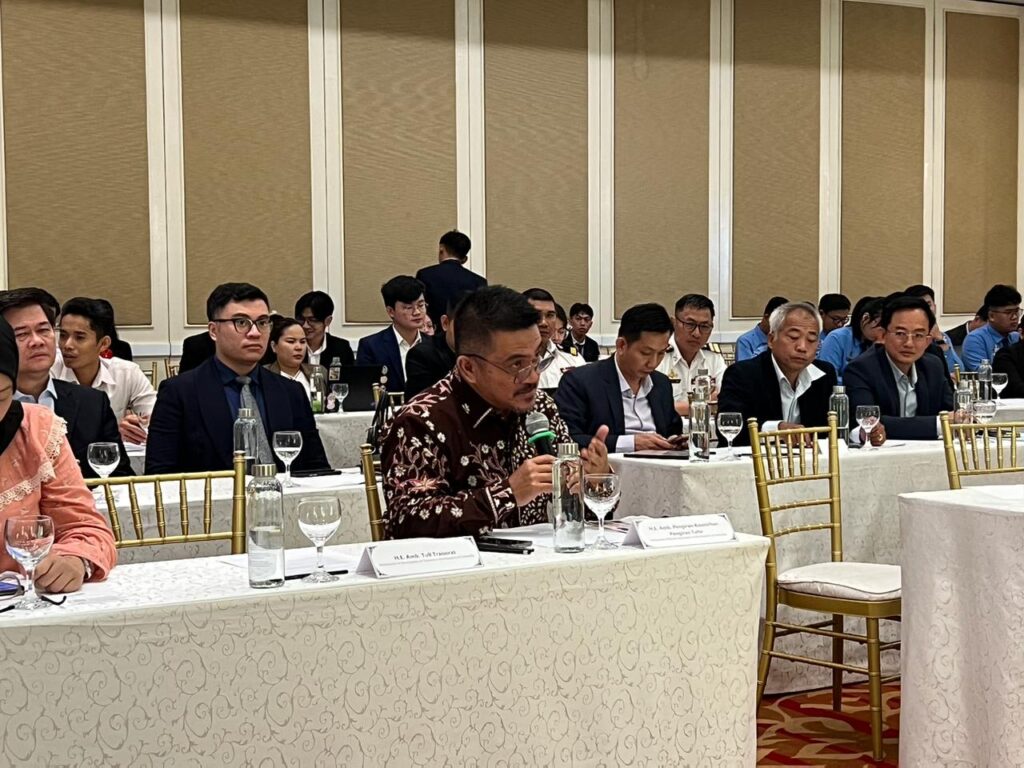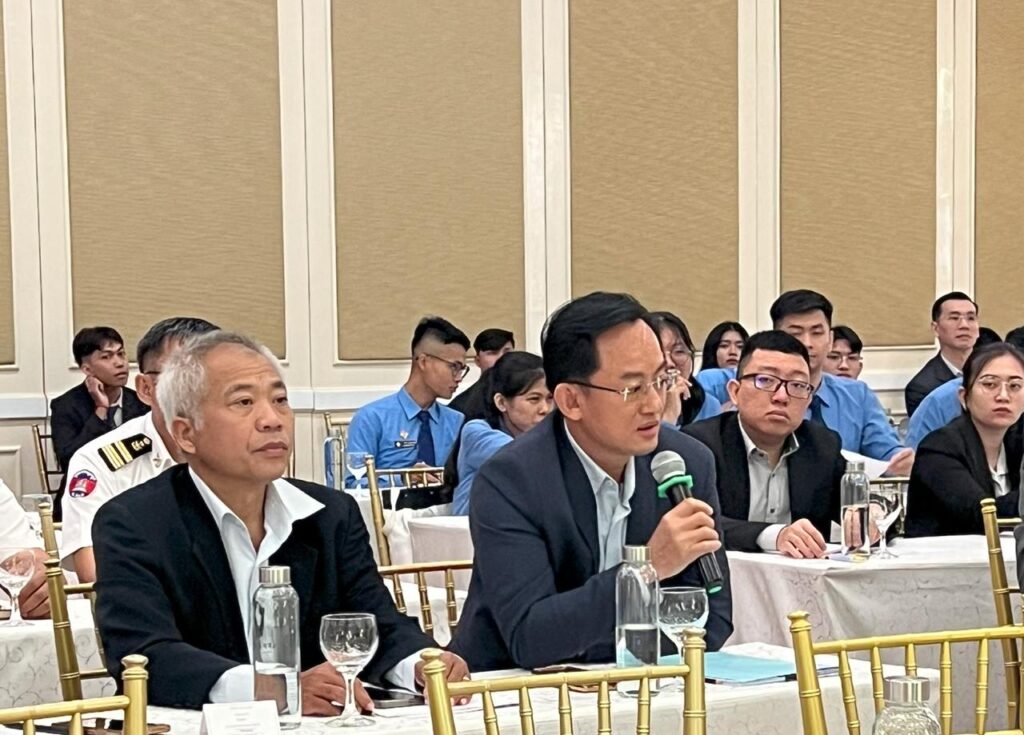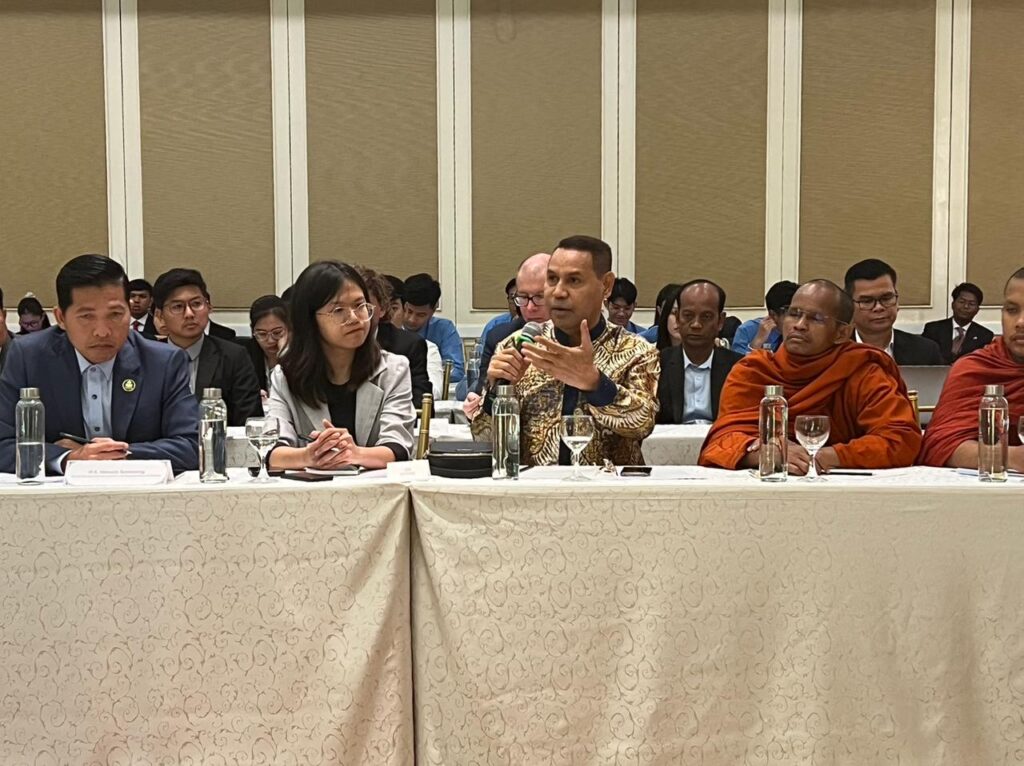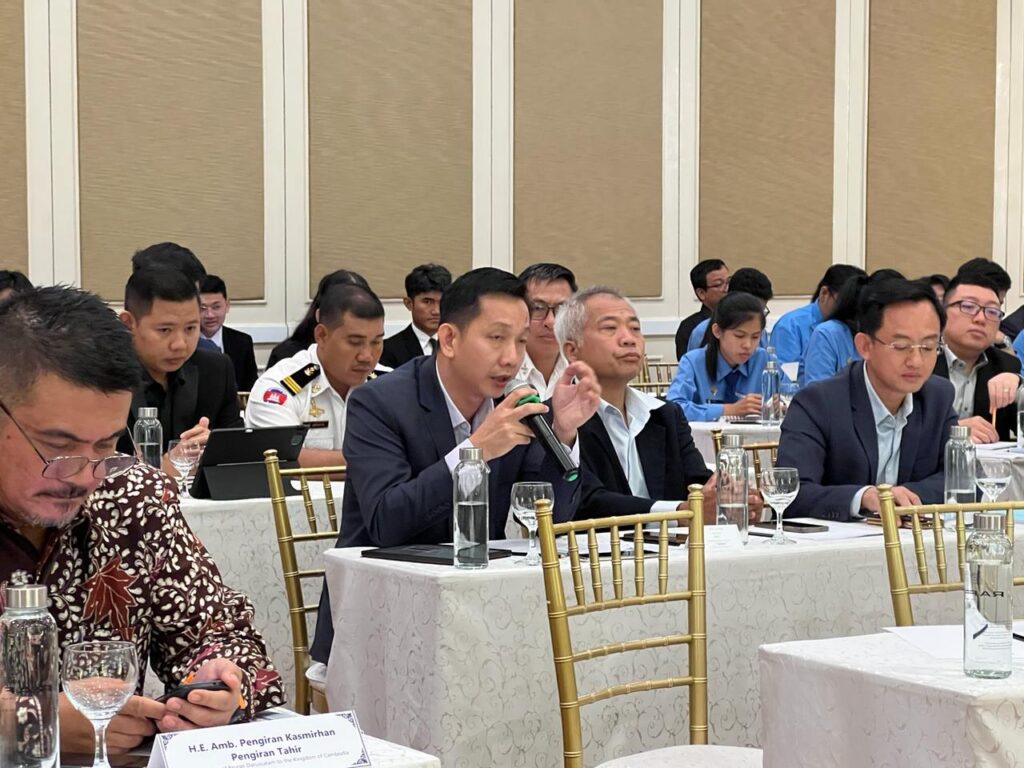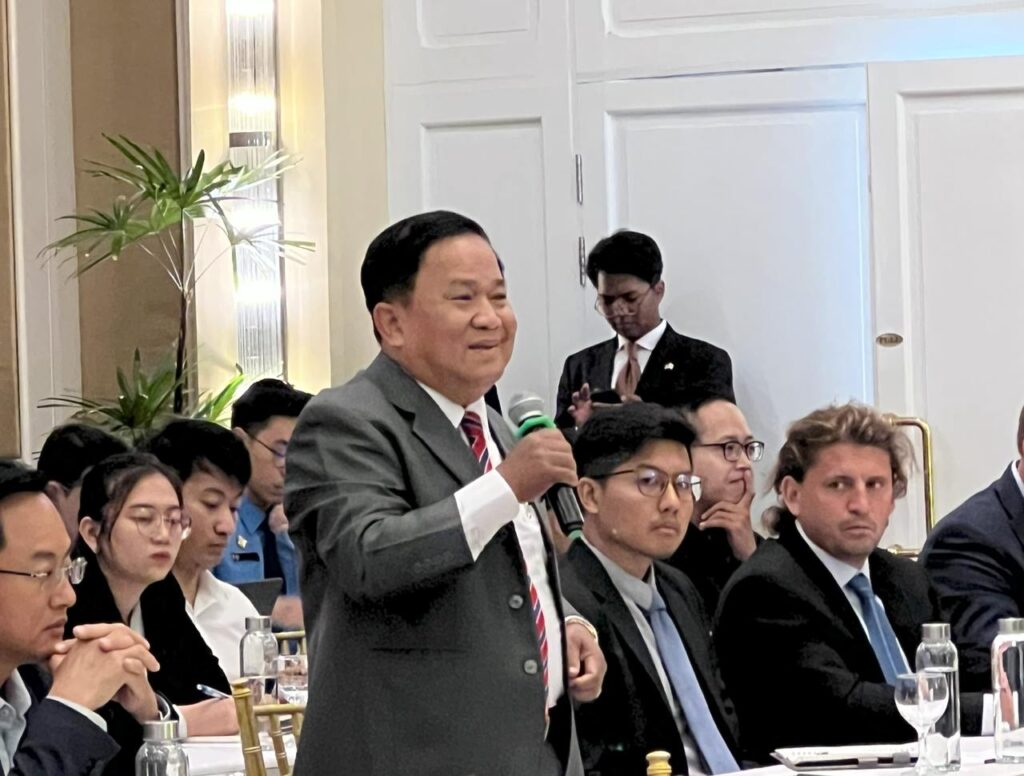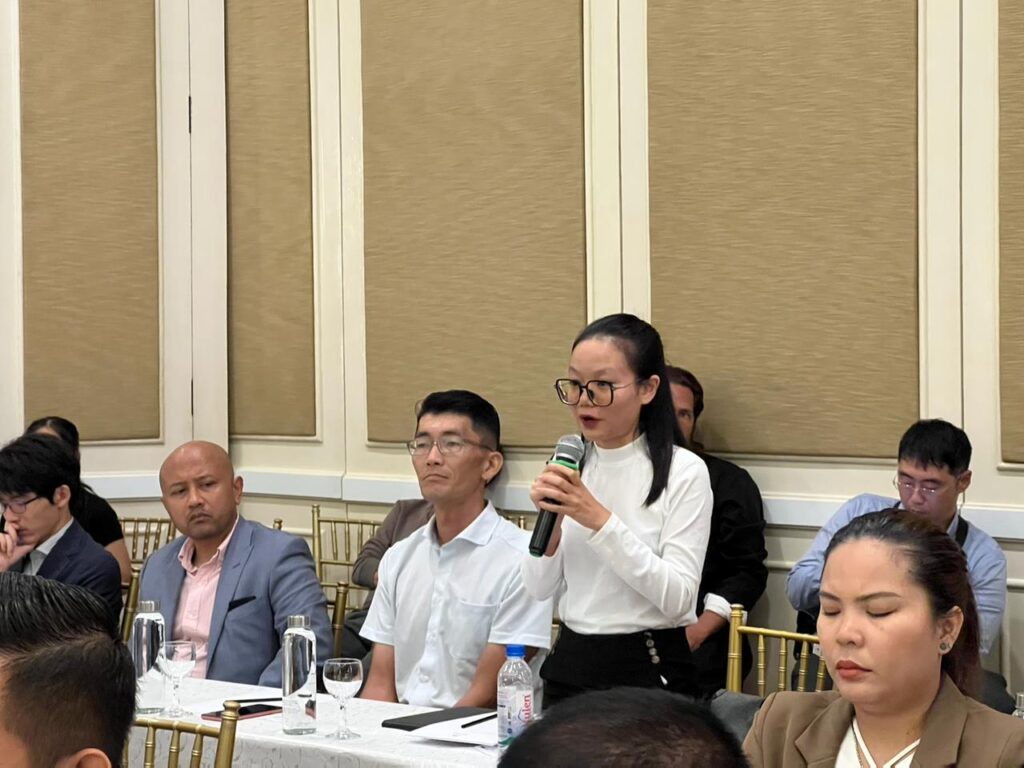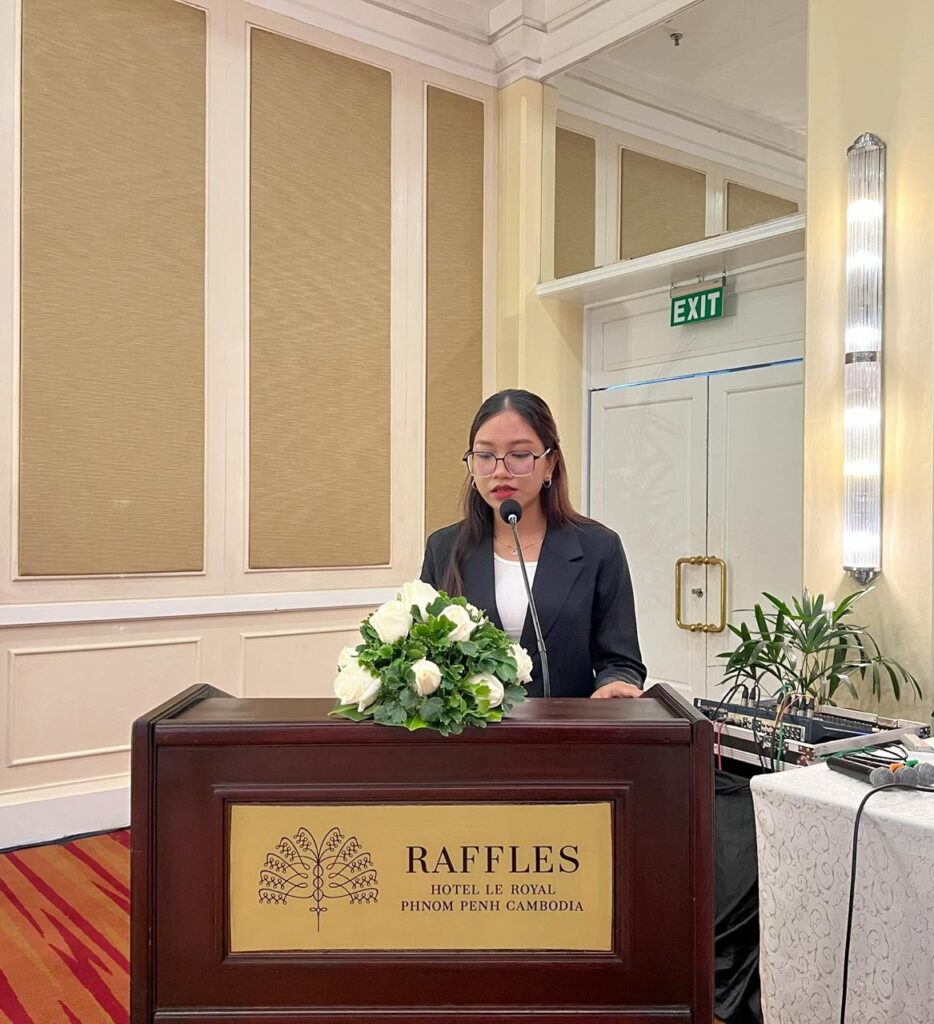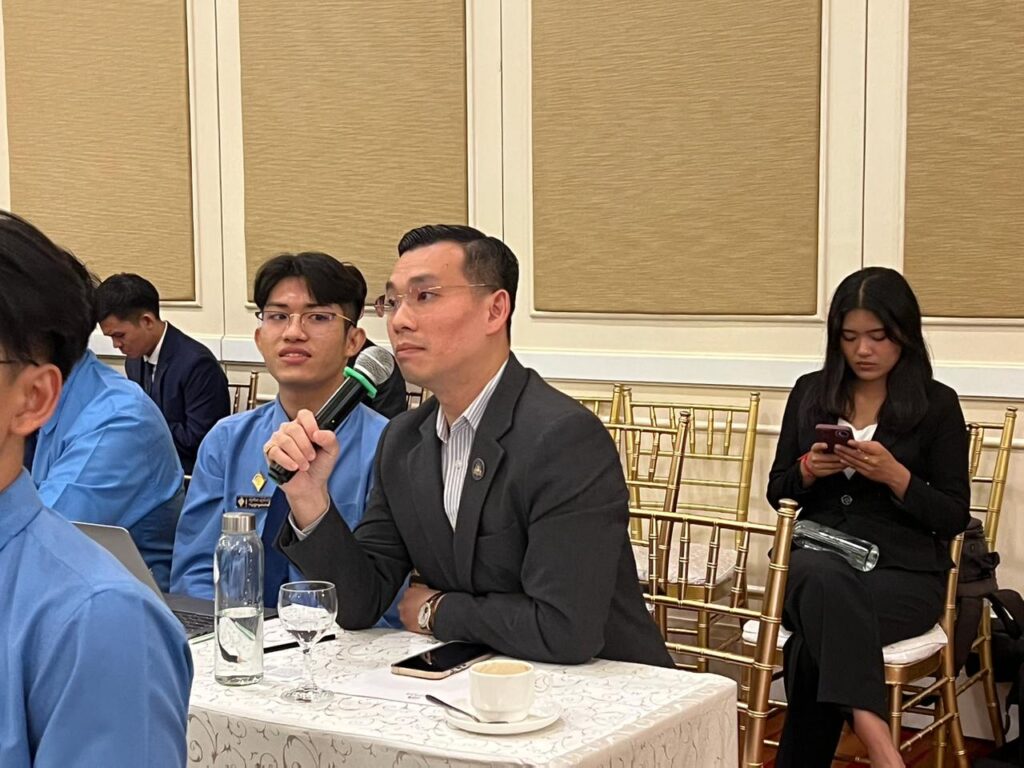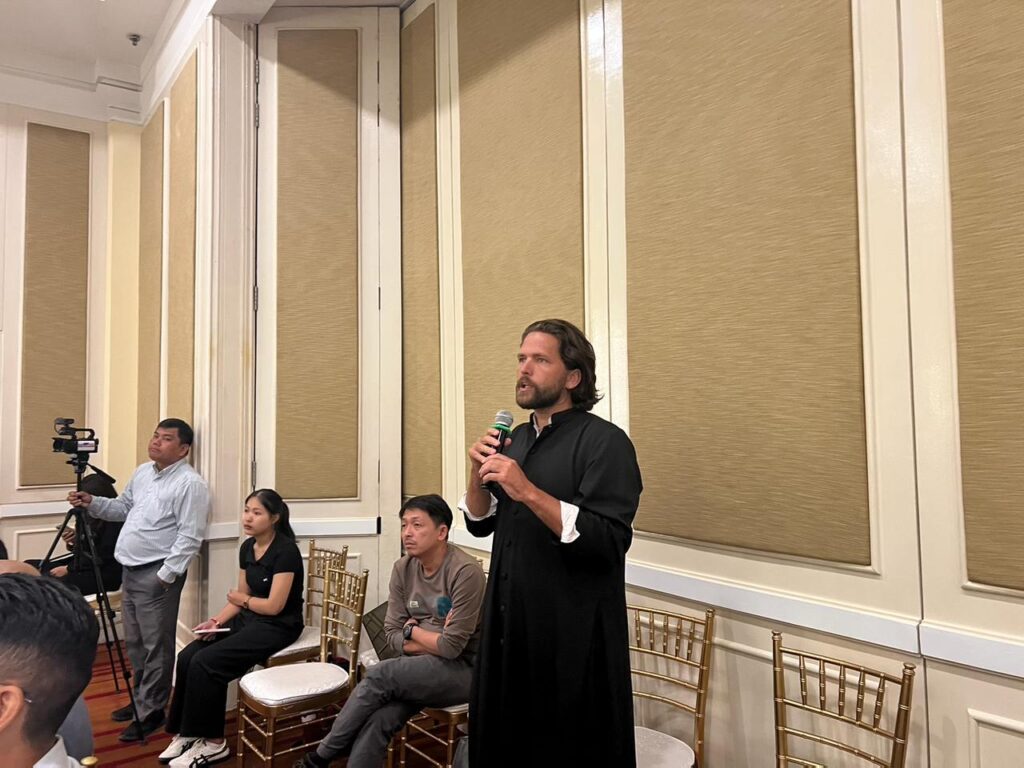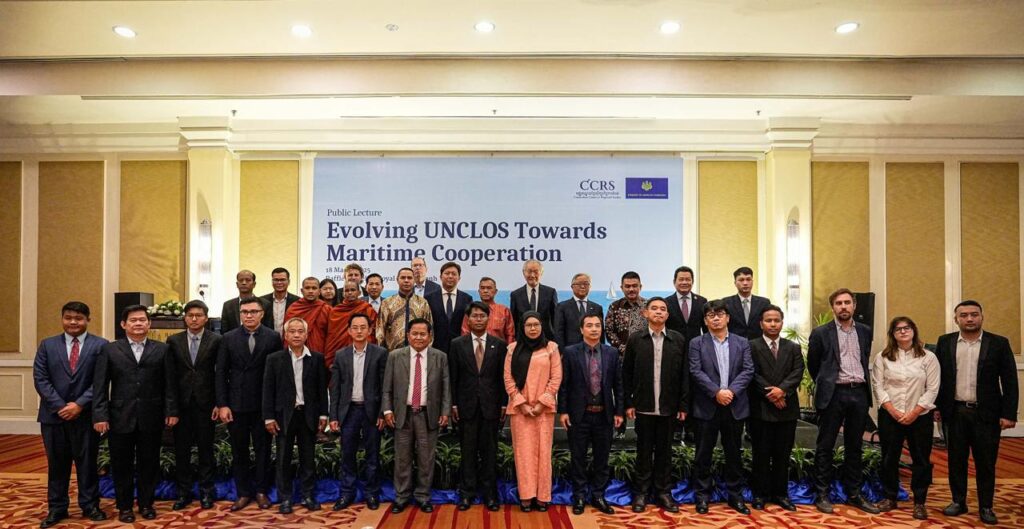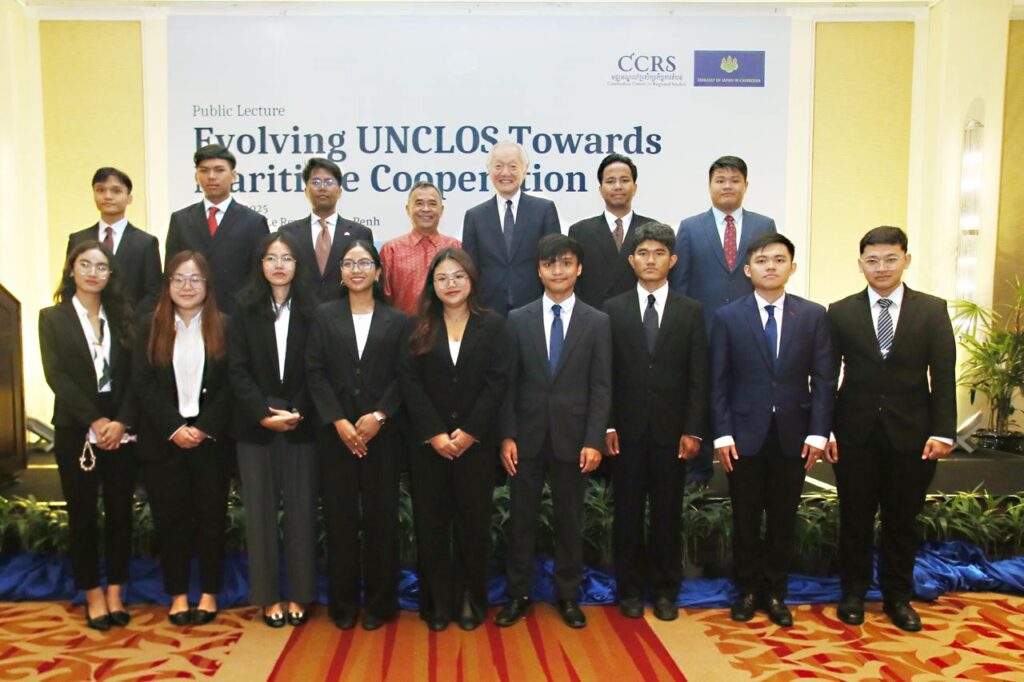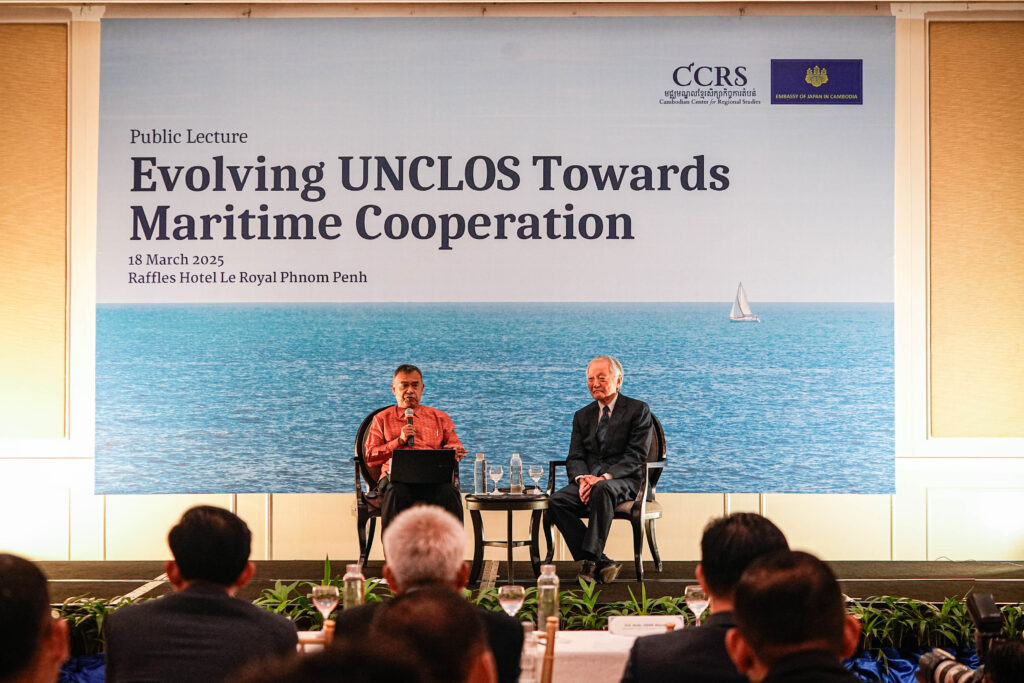On 18 March 2025, from 9:30-11:30am, at Raffles Hotel Le Royal, Phnom Penh, the Cambodian Center for Regional Studies (CCRS) and the Embassy of Japan organized a public lecture on “Evolving UNCLOS Towards Maritime Cooperation” by a Distinguished Speaker, the Honorable Judge Horinouchi Hidehisa, Member of the International Tribunal for the Law of the Sea (ITLOS). The lecture was moderated by Amb. Pou Sothirak, Distinguished Senior Advisor to CCRS. More than 100 participants attended this event from the Senate, National Assembly, Royal Government of Cambodia, diplomatic corps, think tanks, academia, universities, and press.
During the opening, Mr. Him Raksmey, Executive Director of CCRS, warmly welcomed the participants, and expressed deep appreciation to the Embassy of Japan for the kind support. He mentioned that this lecture is the fourth in the series of the collaboration between CCRS and the Embassy of Japan. Similar events were held from the past included: Seminar on the Law of the Sea: Towards Peaceful Maritime Cooperation in Southeast Asia on 19 February 2024; Regional Seminar on Towards Free and Open Indo-Pacific: Prospects and Challenges on 17 October 2024; and Public Lecture on Roles of International Law in Promoting Peaceful Dispute Settlement in the Indo-Pacific on 29 January 2025. CCRS is extremely pleased that a full house of more than 100 audiences attending today lecture, including senior officials from the Senate, and the Royal Government of Cambodia friendly Ambassadors and members of the diplomatic corps members of think tanks, academia, representatives of the civil society, press corps and university students. This public lecture aims to explore the benefits of international instruments such as UNCLOS and ITLOS for coastal states and explore the crucial role and evolving character of UNCLOS and ITLOS, in promoting the rule of law in the sea.
H.E. Ueno Atsushi, Ambassador of Japan to Cambodia, extended appreciation to CCRS for organizing this public lecture. He stated that the world today is becoming increasingly unstable and complex. There are diverse global threats and challenges that are creating geopolitical and geoeconomic risks. As ocean-related activities also have increased and diversified in recent years, international laws are becoming increasingly important for maintaining and developing a maritime order based on the “rule of law.” In this context, he holds the view that UNCLOS plays an essential role as a legal framework that governs maritime activities. He has high regard toward the honorable Judge HORINOUCHI who is not just a member of the very prestigious ITLOS but also has extensive experience handling maritime issues that Japan faces with its neighbors, particularly China, both at the Tokyo Headquarters and overseas missions. H.E. Ambassador Ueno encouraged all participants to make full use of Honorable Horinouchi’s lecture and the discussion afterward.
Prior to handing the floor the distinguished speaker, Amb. Pou Sothirak, Distinguished Senior Advisor to CCRS, provided briefly contexts of the lecture and introduced the Honorable Judge. This lecture aims at highlighting the importance of UNCLOS and improving better understanding of how such law of the sea can be used to render relevant benefits for coastal states. UNCLOS remains a pillar to advance peaceful dispute settlements at the sea as it represents a comprehensive legal framework governing all activities in the ocean including resource management, and environment protection while respecting the sovereignty of coastal states. This is an important opportunity for participants in Cambodia to gain deeper knowledge of UNCLOS as an acceptable convention for establishing the foundation of the legal order governing the uses the resources of the oceans, as well as how states standardize their maritime claims and resource management, as well as promote peaceful settlements should disputes arise.
The moderator informed the audiences that the honorable guest speaker will lay out how the law of the sea had evolved since the Third United Nations Conference on the Law of the Sea in 1973 to the adoption in 1982 and its entry into force in 1994. In addition, he will describe the universality aspect of UNCLOS and help us understand better why UNCLOS is known as the constitution of the Ocean and its progression over time. The honorable Judge Horinouchi will end his presentation by discussing the benefits UNCLOS has to offer to the littoral states, particularly with regard to fishery, bio-diversity, and climate change. The lecture is delivered to encourage Cambodia to ratifies UNCLOS in the way so as the country can reap full benefits from the Convention.
Honorable Judge Horinouchi Hidehisa delivered an interesting and insightful presentation.
He started by discussing how UNCLOS has evolved over time. It was conceived during the Third United Nations Conference on the Law of the Sea in 1973, adopted in 1982, and entered into force in 1994. With 168 Parties, UNCLOS is widely considered as international law with universal applications, and regarded as “Constitution for the Oceans” that governs all activities in the oceans including maritime boundary, fishery, marine biodiversity conservation, navigation and offshore developments.
UNCLOS has also evolved in characters, with subsequent supplementary agreements consented by state parties were adopted. At the initial stage, the focus of UNCLOS was placed on establishing the legal framework for the deep seabed beyond national jurisdiction, declaring it the “Common Heritage of Mankind” as part of the convention’s Part XI. State parties agreed on the details on how to do so in an agreement related to the implementation of Part XI of UNCLOS in July 1994.
Later on, detailed framework was in place in the field of fisheries born from UNCLOS, particularly on Conservation and Management Resources of High Seas in Part VII. In August 1995, state parties agreed for the Implementation of the Provisions of UNCLOS Relating to the Conservation and Management of Straddling Fish Stocks and Highly Migratory Fish Stocks.
The field of maritime bio-diversity beyond national jurisdiction was developed. Building upon the Convention on Biological Diversity in 1992, a UN General Assembly resolution adopted in June 2015 decides to develop an international legally binding instrument under UNCLOS on the conservation and sustainable use of marine biological diversity of areas beyond national jurisdiction. In June 2023, states reached an agreement under the UNCLOS on the Conservation and Sustainable Use of Marine Biological Diversity of Areas beyond National Jurisdiction.
Now, given the increased impacts of climate change, there are growing momentums to discuss implications of climate change on ocean governance under UNCLOS. According to an Advisory Opinion in 2024 submitted by the Commission of Small Island States on Climate Change and International Law that included 34 UNCLOS state parties and 9 intergovernmental organizations, climate change can result to deleterious effects as harm to living resources and marine life, hazards to human health, hindrance to marine activities, including fishing and other legitimate uses of the sea, impairment of quality for use of sea water and reduction of amenities.
While UNCLOS has its own limitation, this international convention has evolved over times that provides clearer legal frameworks to safeguard maritime interests and resource managements to coastal states like Cambodia.
After the distinguished speaker’s presentation, there were interactive exchanges of views between the Honorable Judge, the moderator, and the participants. During the discussion, there were frank and open exchanges between the distinguished speaker and the audiences who asked provocative questions. The Honorable Judge was able to deliver appropriate and satisfactory answers on those key questions which were posed including benefits and risks for Cambodia of ratifying UNCLOS, the relevance of UNCLOS in addressing the issues concerning the South China Sea dispute, enforcement challenges of UNCLOS, connection between UNCLOS and International Labor Convention, and technical aspects of UNCLOS on fisheries and baseline delimitations, among others.
With regard to the issues related to ratifying UNCLOS for small states, the discussion can be summarized as follows:
UNCLOS gives clarity in international frameworks and mechanisms to peacefully settle disputes, especially for small states to safeguard their sovereignty and utilize economic resources in the maritime domains in a sustainable way. Eminent Ambassadors from East Timor and Brunei to Cambodia who participated in the lecture provided outstanding comments on how UNCLOS has assisted the two countries to benefit greatly from using UNCLOS in protecting their sovereignty claims and negotiations over settlements on maritime resources management with bigger neighbors namely Australia and Malaysia, respectively. Moreover, H.E. Ambassador of Brunei has given sound advice for the audience to understand clearly the benefits UNCLOS for small states. For Brunei, UNCLOS gives a clear legal framework in the negotiation with neighboring country, allowing Brunei to work with Malaysia on how to refer to UNCLOS to exploited the oil fields to the advantage of both sides. The two countries have used conciliatory accessibility of the dispute settlement mechanisms which does not mean that states have to drag other friendly states to court. And of course, once becoming a ratified party to UNCLO, it gives states the legal strength on their sovereignty claims and able to exploit their economic resources within the limit of their EEZ especially on their maritime domain.
In wrapping up the public lecture, Amb. Pou Sothirak concluded that the participants were able to gain better understanding of the evolving characters of UNCLOS and how important this international convention is for small states in safeguarding territorial sea and natural maritime resource. He provided key takeaways of this lecture including:
– UNCLOS has been ratified by most nations with a view that such convention provides a comprehensive framework for the peaceful use and management of the world’s oceans. Ratification of this convention was motivated by states for the desire to resolve all maritime law-related disputes in a spirit of understanding and cooperation, and conscious of this Convention’s historical significance as a valuable contribution to upholding peace, justice, and progress for all peoples of the world.
– States with coastal lines stand to benefit greatly from UNCLO. Besides providing effective legal backing with due consideration for the sovereign rights of all state parties to the convention, UNCLOS facilitates international communication, encourages the peaceful use of the seas and oceans, the equitable and efficient utilization and exploitation of marine resources, the conservation of their living resources at sea, the protection, and preservation of the marine environment.
– The world of UNCLOS is evolving and although UNCLOS is rightly described as a constitution of the law of the sea, it does not and cannot give answers to all problems and doubts that arise in practice that are related to such issues as global warming, protection of biodiversity, IUU legal status, controversy concerning shipping, the complex interpretation of the delimitation issues related to baselines, just to mention a few.
– The Honorable Judge suggested that Cambodia ratified UNCLO so as to safeguard the country maritime sovereignty and claim possession of natural resources the sea has to offer within Cambodia’s legal considerations and rights. Ratifying UNCLOS can give Cambodia the foundation to secure the same legal rights from the sea and can enhance maritime cooperation with neighboring countries wherever UNCLOS has jurisdiction over.
In conclusion and on behalf of CCRS, Amb. Pou Sothirak expressed his appreciation to the Honorable Judge Horinouchi Hidehisa for the thought-provoking lecture, and to the Japanese Embassy for the kind support in making this stimulating lecture possible. He thanked all other distinguished guests and participants for actively engaging in the preceding discussions.
The event was concluded in a cordial manner following a networking reception.
